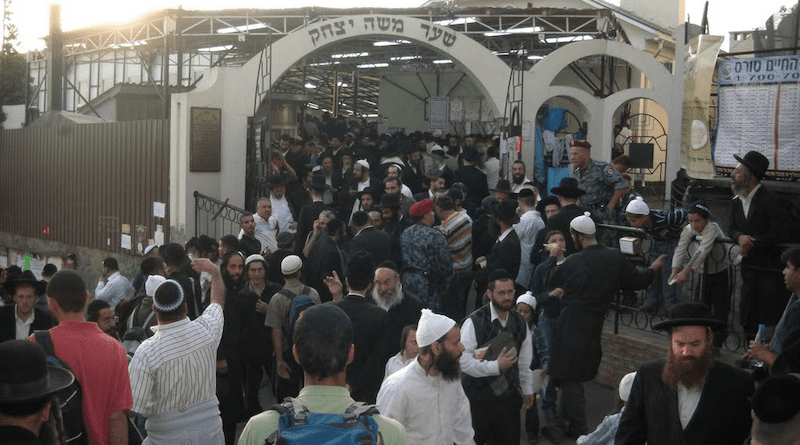Thirty Two Thousand Orthodox Jews Travel To Ukraine For New Year Pilgrimage Despite Wartime Warnings – OpEd
The U.S., Israeli and Ukrainian governments have all called it an extremely dangerous trip into an ongoing war zone. But despite the warnings, tens of thousands of Jewish men and boys are expected to travel to Uman, Ukraine, for an annual Jewish New Year (5784) pilgrimage that pays tribute to a very influential Hasidic Rabbi Nachman of Breslov whose best known teaching was: “The whole world is one long narrow bridge, so it is essential not to let yourself become fearful.”
Uman was last hit by Russian missiles in June while in April, 23 civilians were killed, including three children, after more than 20 long-range Russian missiles struck a residential neighborhood.
As of the morning of September 15, the Ministry of Internal Affairs of Ukraine confirmed that 32,332 Hasidic pilgrims had arrived in Uman. Before the afternoon is over there might be 35,000+ Hasidim in Uman.
One of the most important teachings of the Hassidic Rabbis was not to worry about the future or sacrifice present joy because you fear it will not last very long. After all, most things people worry about never occur.
The gravesite of Rabbi Nachman, located in the Jewish cemetery in Uman, serves as a pilgrimage destination for Hasidic Jews from across the globe. Prior to Russia’s full-scale invasion of Ukraine, the number of visiting Hasidic Jews typically ranged from 20,000 to 40,000.
In 1941, the Germans deported the entire Jewish community in Uman, murdering 17,000 Jews and destroying the local Jewish cemetery, including the burial place of Rabbi Nachman, which was eventually recovered and relocated to a new place. About 1 million Ukrainian Jews were killed during the Holocaust.
Rabbi Nachman of Breslov (1772 –1810) was the great grandson of the founder of the Hasidic movement the Baal Shem Tov’ (1700-1760) who taught his disciples: “You are wherever your thoughts are. Make sure your thoughts are where you want to be.” and “Always remember that joy is not merely incidental to your spiritual quest. It is vital.”
Rabbi Nachman of Breslov also taught, “Get into the habit of dancing. It will displace depression and dispel hardship.” A Hassidic Sage who was near death got up and danced. When they tried to stop him he said, “This is exactly the time to dance.” He then told his disciples a story and concluded, “When they (hard circumstances) come to you with a very difficult demand, that is exactly the time to dance.”
All of our virtues (love, faith, courage, trust, etc) are tested in times of adversity, and that is exactly when we really need to exemplify them. As Rabbi Nachman said, “Tears open up (Heaven’s) gates, singing hymns bring’s down (many kinds of) barriers.”
As Rabbi Mordecai of Lekhovitz taught, “We must not worry. Only one worry is O.K. We should worry about (always) being worried.”
Another Hassidic Rabbi, Yaakov Yitzhak of Apt, began his spiritual journey with this experience from before he became a Rabbi. Once when I was walking along a road by myself, I came upon a huge hay wagon which had overturned. A peasant standing beside the wagon called out to me, begging me to help him lift up the wagon.
I knew that the Torah says (Deuteronomy 22:4) that it is a Mitsvah (a religious responsibility) to help someone (even a stranger) in a situation like this, but I was sure I was inadequate to do it; so I replied,” I can not do it”.
He replied that I could, but I was not willing. That struck me to the heart. So we took some boards and inserted them under the wagon as levers, and using all our strength, we lifted the wagon upright. Then together we lifted the bales of hay and placed them on the cart.
I asked the peasant if I could walk with him along the road and he said, “come right along brother”. We walked along together. Then I asked him why he had said I was unwilling to help him. He replied, “Because you said you could not do it. No one knows if he can do something until he has tried to do it.”
“But why did you think I could do it?’ I asked. He answered that he needed help; and he thought maybe I had come along this way, at this time, to help him. I smiled and said,”Soon you will tell me that your wagon overturned in order that I might help you.” and he said, “Of course brother, what else.”

